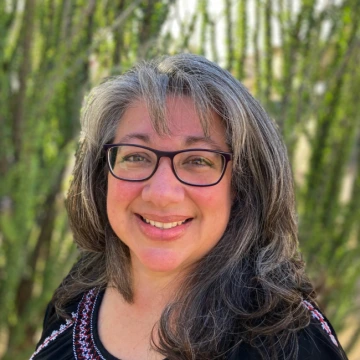Dr. Christina Rivera
Professor of Practice, Disability and Psychoeducational Studies
Dr. Christina Rivera is a Professor of Practice in the Department of Disability and Psychoeducational Studies and serves as the Director of both the Special Education–Deaf/Hard of Hearing teacher preparation program and the Accelerated Master’s Program. With more than 30 years of experience in deaf education, she has worked as a researcher, PK–12 teacher and supervisor, parent advisor, and sign language instructor for families of deaf children. She is the Principal Investigator and Project Director for Project OIC: Enhancing Professional Preparation through Online Interdisciplinary Collaboration and Representation and Diversity in Early Childhood Deaf Education, both funded through OSEP personnel preparation grants. She also served as the research coordinator for the Center on Literacy and Deafness at the University of Arizona. Dr. Rivera has authored and co-authored numerous peer-reviewed articles, book chapters, and scholarly presentations. Her research interests focus on teacher quality, the itinerant model of service delivery, and the unique needs of deaf and hard-of-hearing (DHH) students who are culturally and linguistically diverse. Through her leadership, scholarship, and extensive professional experience, she continues to advance the preparation of teachers and the educational equity of DHH learners.

"I am inspired by the women in my family. They are the most hard-working individuals I know and have pushed me to where I am now by their encouragement and example. I am inspired by my sons. Being raised in a single-parent household, life hasn’t been easy for them, particularly when I went back to school for my doctorate. Their resilience and support sustain me."
Who do you draw inspiration from and why?
So many people! I am inspired by the women in my family. They are the most hard-working individuals I know and have pushed me to where I am now by their encouragement and example. I am inspired by my sons. Being raised in a single-parent household, life hasn’t been easy for them, particularly when I went back to school for my doctorate. Their resilience and support sustain me. Finally, I am inspired by the new generation of BIPOC and Deaf researchers who are shedding necessary light on the issues of diversity, equity, inclusion, and accessibility in special education, using points of view and discourse that I, after 30+ years in this field, consider brave. I have great respect for previous researchers, especially my mentor, Dr. Shirin Antia, and we all stand on their shoulders as we continue the work.
What are one or two accomplishments of which you are most proud?
Raising my boys to the amazing young men they are today is my greatest accomplishment. Professionally, I’m proud of the two Department of Education Office of Special Education Programs (OSEP) Personnel Preparation grants I have received. I was that student who needed financial support to get my master’s and doctoral degrees. It brings me great joy to be able to offer this funding to my students, and it brings me professional satisfaction to implement the goals established within each grant project.
"My hope is that students who complete my program can convey the message that language is language, and we can do better to support the development of our DHH children."
What advice would you give to your younger self?
Have more fun and take more chances! I am an introvert. I love being home and have no problems being by myself. However, I realize now that this may have interfered with finding adventure when I was younger. I mean to change that as I move closer to retirement.
What is something you are working on currently that you’re excited about?
With help from one of my OSEP grants, Representation and Diversity in Early Childhood Deaf Education (RAD-ECDE), I have been updating program courses to reflect current thinking in Deaf Education, including the need to reduce the occurrence of language deprivation in d/Deaf and Hard of Hearing (DHH) children by introducing sign language as early as possible. This goal drives the creation of an early intervention and early childhood emphasis in my program. Philosophically, this perspective is unique as most early intervention programs in this field emphasize listening and spoken language. My hope is that students who complete my program can convey the message that language is language, and we can do better to support the development of our DHH children. While I have always considered myself a hearing ally, the RAD-ECDE grant has given me an opportunity to identify hearing bias in myself that may be conveyed in the program and explore ways to change it. Throughout their program, I encourage my students to do the hard work of identifying their own bias, and give them opportunities to practice changing the language and practices they use so we can better support DHH children and their families – we all have more work to do.
"Finally, I am inspired by the new generation of BIPOC and Deaf researchers who are shedding necessary light on the issues of diversity, equity, inclusion, and accessibility in special education, using points of view and discourse that I, after 30+ years in this field, consider brave."
Explore Dr. Christina Rivera's Publications:
- The quality of teaching behaviors in learning environments of DHH students (co-authored with Drs. Catalano, Branum-Martin, Lederberg & Antia)
- Best practices in early intervention and PK-12 education of deaf and hard of hearing children (co-authored with Dr. Jun)
- Explicit and Contextual Vocabulary Intervention: Effects on Word and Definition Learning (co-authored with Drs. Antia, Catalano & Creamer)

